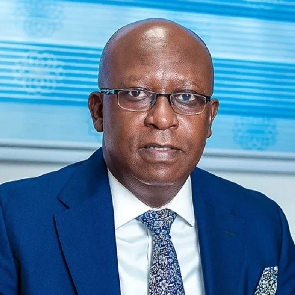 Archie Hesse, CEO of the Ghana Interbank Payments and Settlements Systems
Archie Hesse, CEO of the Ghana Interbank Payments and Settlements Systems
Ghana has been recognized as the only country that has reached maturity stage in access to financial inclusion in Africa. This is contained in this year’s State of Inclusive Instant Payment in Africa Report put together by AfricaNenda and launched at the Mobile World Congress Africa 2022 in Kigali, Rwanda. The report seeks to tell a story about all instant pay rollouts across the continent to identify the areas of commonality with the view to driving adoption to boost financial inclusion on the continent. This year, the report focused on inclusive instant payment systems in 12 Africa countries and Ghana was the only country that scored 100percent on access to financial inclusion. Ghana’s feat was based on the successful mobile money interoperability (MMI) platform, which integrates all payments platforms across banks, fintechs and telcos, giving access to every Ghanaian to make and receive instant payment. Ghana’s mobile money interoperability is hosted by a state institution – Ghana Interbank Payments and Settlements Systems (GhIPSS), headed by Archie Hesse, who was present at the launch of the report in Kigali. During a panel discussion, he explained how GhIPSS was able to achieve that level of financial inclusion by integrating three instant payment platforms into what he called the “financial inclusion triangle.” According to him, GhIPSS started by first integrating banks to make them interoperable on the back of the GhIPSS Instant Pay (GIP); then GhIPSS introduced a biometric payment system called e-zwich, which was also made interoperable, before moving on integrate the mobile money operators into an interoperable platform. “What we then did was to close the triangle by making all the three platforms interoperable to ensure that no matter who is making payment and from wherever, they will be able to do so seamlessly and instantly,” he said. Archie Hesse said GhIPSS has since improved the services by adding other services like Proxy Pay, Internet Gateway Payment, Request to Pay and the Universal QR Code dubbed GHQR, which can be linked to both bank accounts and digital wallets, with affordability as the key driving force. He said GhIPSS, in collaboration with the banks have also come up with a bank-wide wallet called GhanaPay to ensure that the banks also play a role in the mobile money space with the view to bridging the financial inclusion gap. Meanwhile, there is still a gap of about 32percent in Ghana’s financial inclusion target, but that is not for lack of access, but more to do with education and individuals’ slowness to adoption. Archie Hesse believes that with the introduction of GhanaPay, plus regular public education on the advantages of instant payment, that gap will be close. He also underscored the importance of fintechs in driving adoption, saying that “fintechs are the ones that will innovate and create services in the areas of insurance, agriculture and others to drive last mile adoption.”
Ghana has been recognized as the only country that has reached maturity stage in access to financial inclusion in Africa. This is contained in this year’s State of Inclusive Instant Payment in Africa Report put together by AfricaNenda and launched at the Mobile World Congress Africa 2022 in Kigali, Rwanda. The report seeks to tell a story about all instant pay rollouts across the continent to identify the areas of commonality with the view to driving adoption to boost financial inclusion on the continent. This year, the report focused on inclusive instant payment systems in 12 Africa countries and Ghana was the only country that scored 100percent on access to financial inclusion. Ghana’s feat was based on the successful mobile money interoperability (MMI) platform, which integrates all payments platforms across banks, fintechs and telcos, giving access to every Ghanaian to make and receive instant payment. Ghana’s mobile money interoperability is hosted by a state institution – Ghana Interbank Payments and Settlements Systems (GhIPSS), headed by Archie Hesse, who was present at the launch of the report in Kigali. During a panel discussion, he explained how GhIPSS was able to achieve that level of financial inclusion by integrating three instant payment platforms into what he called the “financial inclusion triangle.” According to him, GhIPSS started by first integrating banks to make them interoperable on the back of the GhIPSS Instant Pay (GIP); then GhIPSS introduced a biometric payment system called e-zwich, which was also made interoperable, before moving on integrate the mobile money operators into an interoperable platform. “What we then did was to close the triangle by making all the three platforms interoperable to ensure that no matter who is making payment and from wherever, they will be able to do so seamlessly and instantly,” he said. Archie Hesse said GhIPSS has since improved the services by adding other services like Proxy Pay, Internet Gateway Payment, Request to Pay and the Universal QR Code dubbed GHQR, which can be linked to both bank accounts and digital wallets, with affordability as the key driving force. He said GhIPSS, in collaboration with the banks have also come up with a bank-wide wallet called GhanaPay to ensure that the banks also play a role in the mobile money space with the view to bridging the financial inclusion gap. Meanwhile, there is still a gap of about 32percent in Ghana’s financial inclusion target, but that is not for lack of access, but more to do with education and individuals’ slowness to adoption. Archie Hesse believes that with the introduction of GhanaPay, plus regular public education on the advantages of instant payment, that gap will be close. He also underscored the importance of fintechs in driving adoption, saying that “fintechs are the ones that will innovate and create services in the areas of insurance, agriculture and others to drive last mile adoption.”